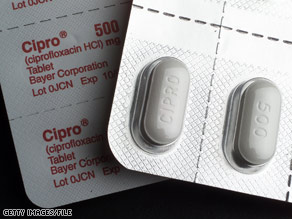 Fluoroquinolones are a family of antibiotics with a wide range of action against both gram-positive and gram-negative bacteria. Because they are easily taken up by human cells, fluoroquinolones are commonly used against bacteria that inhabit host cells.
Fluoroquinolones are a family of antibiotics with a wide range of action against both gram-positive and gram-negative bacteria. Because they are easily taken up by human cells, fluoroquinolones are commonly used against bacteria that inhabit host cells.Unfortunately it appears that these very useful and widely used drugs may have a number of serious side effects. Just last month the FDA ordered their strongest "black box" label warning to alert patients to the danger of possible tendon ruptures and tendonitis.
The FDA is not releasing numbers but apparently there have been 'hundreds' of cases of Achilles tendon ruptures. Obviously there is an interaction with lifestyle here, and those that are physically fit, and put pressure on the Achilles tendon are most likely to be injured.
'Sometimes patients have no symptoms before they experience a rupture in their tendon -- commonly their Achilles tendon. Sometimes it's been reported on the first day of taking a fluoroquinolone ... a sudden snap or popping sound that is tendon rupture with no preceding warning.'
So, if you have to take an antibiotic for any reason, do your homework. Look up the side effects. If it seems you are at extra risk for those side effects (like you run or play a sport) then you might want to ask your doctor if there are alternatives. Quinolone antibiotics associated with tendonitis and tendon rupture include Cipro and generic ciprofloxacin, Factive (gemifloxacin), Levaquin (levofloxacin), Avelox (moxifloxacin), Noroxin (norfloxacin), and Floxin and generic ofloxacin.
2 comments:
"Obviously there is an interaction with lifestyle here, and those that are physically fit, and put pressure on the Achilles tendon are most likely to be injured."
The above statement is grossly in error.
A persons lifestyle has little to nothing to do with this side effect. The fluoroquinolones have shown to be DIRECTLY toxic to tendon tissues and this has been reported since 1982. One case involves a patient who was adjusting a guitar string and ruptured the tendon in his finger. Such injuries can take place LONG after therapy has been discontinued as well. There have been reports of well over a year after therapy had been discontinued of such ruptures. And such ruptures can take place in any patient at any time irregardless of thier lifestyle.
I think you may be unclear on the meaning of 'interaction' here. An interaction does not rule out there being a direct toxic effect - just that the effects of lifestyle and flouroquinolone exposure are not simply additive.
Post a Comment